#i cannot express to you that the first ~5 are almost entirely exposition
Explore tagged Tumblr posts
Text
i will not be gaslit by my youtube recommendation feed into thinking transformers one was good
#fun? enjoyable? would watch again? for sure#good? absolutely not#i cannot express to you that the first ~5 are almost entirely exposition#only for the protagonist to then go ' i already knew all of that '#not to mention the pacing is actually insane i was checking my watch repeatedly to see how much more of the movie was left#because it felt like the movie was ending for like half an hour#and the dialogue in the end credit scene actually makes me laugh just thinking about it#but i do want to say that when starscream showed up i did get excited#bc he's one of like five transformers characters i can recognize on sight#and i was like oh my god!!! its the guy!!!1 and he's steve buscemi#i speak
1 note
·
View note
Text
DBS: Broly - Review
I was excited to see “Dragon Ball Super: Broly”, obviously… It’s Dragon Ball! But I wasn’t expecting to be as blown away by it as I have been, to fall in love with it. For me, Dragon Ball has always been more about the fandom than the official media. When I first formed a love for the franchise, it was elusive and unattainable, so I had to get my kicks elsewhere.
I think DBS Broly might be my favourite piece of DB media, ever. It’s everything I ever wanted and everything I didn’t realise I needed from this franchise. I haven’t loved a piece of media like this in a long, loooong time.
Worth noting that, at the time of writing, I have only seen the English dub. I’ll wait for home release to see the subtitled Japanese audio version as I struggle to keep up with text and visuals at the same time!
The Cinema Experience
My first viewing was a small, packed screen on opening night here in the UK. The audience seemed to be mostly around 25-30 year olds, almost entirely fellow guys (my friend was one of maybe 5 women - seriously, where are you all??). But the ethnic diversity of Dragon Ball’s audience is something most movies could only dream of attracting. It was a great time, with people audibly laughing out loud and clapping at the end. The movie is genuinely so brilliantly funny, a surprise in itself.
My second viewing, the following night, alone, was a larger screening. Roughly the same audience demographics, but this time, the audience erupted into cheering with each transformation… It was so fucking incredible to be a part of. I was grinning the entire time. It’s hard to overstate just how important the social aspect of enjoying this movie in the cinema was.
It’s incredible to finally be living Dragon Ball “up to date” like this and the excitement shows.
Spoilers incoming...
Story Isn’t King
That's coming from someone who has always wished for more depth to DB, but what I've realised recently is that the level of storytelling the community plugs into this franchise is not something that belongs in the official media. We do it better, because we do it free of constraints the official releases require to be Dragon Ball, that it requires to be so widely popular. The official text is a framework, not a rulebook. I think one of the things that contributes to Dragon Ball’s insane popularity and ability to speak to so many people in so many cultures is how vague it can be. The snippets of depth are there for us to draw our own conclusions. DB doesn’t need canon absolutes in backstory.
Overall, I prefer the old “Bardock - The Father of Goku” telling of the prequel events that set up the Broly movie, though man it's been an age since I saw that. I wonder how much of my preference is just nostalgia? How much is knowing that Bardock: Father of Goku wasn’t “canon”, and so didn’t really matter? That is liberating. Now Dragon Ball Minus and DBS: Broly seem to demand that this is the way it actually happened with no room for headcanon and I feel a little turned off. There is plenty to like with this retelling. Gine is a delight, more of the saiyan homeworld is welcomed and just look at small details like Bardock actually moving his tail in this scene rather than it constantly being wrapped around their waists ready for combat. Ideally, I would like a perfect blend of the best elements from both tellings. And ya know what? That's the beauty of fandom... I can have that.

It is so obvious that huge chunks of story are missing here, yet it already drags for me a little... I’m not sure what the solution is, really. I’ve seen people suggesting it should have been two movies, but I’m not sure I agree.
Once the movie skips forward to present day, the storytelling revolving around the discovery of Broly, Paragus and their recruiting into the Freeza force is entertaining and I’m way more invested. So maybe it is just apathy for a prequel story retold a slightly different way…
But when the insane 30-40 minute non-stop action starts in the latter half, that’s when the movie comes into its own for me. This is Dragon Ball.
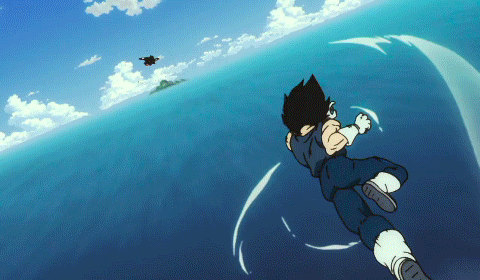
Overall, the narrative does something new for the series. It sets up, foreshadows and references back in a more conventional pattern than ever before. It feels, I dunno. It feels… Westernised? It feels, both narratively and in overall quality, more like a movie and not just a tacked on side-story. There’s no unnecessary inclusion of side characters irrelevant to the plot making cameos. Everyone is here for a reason.
Character Personalities
The characters behave like themselves again, and not just through exposition dumping monologues the series is famous for, but through visual storytelling! There is so much not said, so much told through the fight, through their expressions and movements.
From the moment Vegeta’s playful spar with Goku ends at Bulma’s vacation house, you get a very different Vegeta to the one we’ve seen through Super. His turn to listen to Goku and Whis's conversation is full of character. He's so on edge about something. And proceeds to tell us why with a humorous but genuinely livid jab at Goku for wishing Freeza back to life. Vegeta is worried. In the scene where Bulma is reviewing the CCTV footage of the Dragon Ball theft, Vegeta double takes and glares at Goku when it becomes obvious the thieves are Freeza’s men. They say nothing. It’s all character acting. It tells us so much.


Vegeta's anxiety continues on, affecting his fight with Broly… He barely has a chance to enjoy the fight at all. We get so little cocky Vegeta enjoying a battle and instead a very serious Vegeta who feels the need to to end this threat right now. What I take from all this is an example of quality character development - instead of Vegeta simply becoming more friendly, his personality that we all love is still there, but his morals have changed. His entertainment isn’t as important as protecting his family. And having witnessed Goku’ recklessly endanger their friends and families in throughout DB Super, Vegeta is not prepared to take any chances here, attempting to deliver a finishing blow very early on.
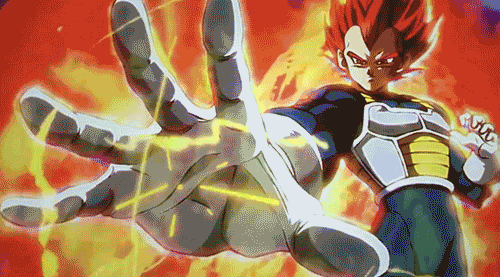
And Goku, who’s characterisation in Super felt so utterly insulting at times, is back on form here. His idiotic moments don’t feel so absurdly stupid that they’re unbelievable, but instead come across as cute and heartwarming. Moments like his talk with Broly mid fight, with Piccolo when he’s lying on the ground battered and bruised and when he’s simply watching Broly transform into a super saiyan for the first time convey Goku’s ability to be serious and regretful. It was so refreshing to see Goku back on form. The first half of his fight with Broly is incredible - going from excitement, to confidence that he could talk Broly round, to being put firmly in his place, on the ground. People who criticise the series for having no stakes fail to understand that the stakes are truly nestled in the characters personalities and their pride. The stakes are whether they will be able to overcome their flaws, both metaphorically through transformations, and literally.

Voice Acting (Dub)
Whilst on the subject of the characters, the voice acting is unbelievably good… Chris Ayres as Freeza steals the show, but the others are brilliant also.The line delivery is one thing, the ability to so brilliantly match that to the mouth flaps another, but the writing for a Western, English speaking audience is just superb. I cannot wait to see what differs in the original Japanese - I’ve heard that Freeza’s “Hello Monkeys!” line was a dub change from “Greetings!” for example, which in my opinion is so appropriate and elicits an uncomfortable, awkward laugh from the aforementioned ethnically diverse audience in the west in a such good way. Freeza as a tyrannical, racist, piece of shit, is an important character trait to a Western audience. The jokes that ride on line delivery alone are so numerous - one personal highlight for me is Whis’ ever-so-gay coded “Oh my…” when Gogeta bursts in. Took the words right out of my mouth, Whis. The voice acting is on a whole different level to anything before now from the American team. The scene I’ve already mentioned where Goku is contacted by Piccolo, Schemmel really sells the pain Goku’s in. And lets not forget Broly himself, played by Vic Mignogna, whose line delivery really conveys him as this Tarzan-like character in his sane scenes… But really shines in moments of mania when he’s flailing, yelling, crying as a cornered, manic, rabid ape who cannot control his emotions or immense strength. The scene where he’s just making noises at Goku, copying his fighting stance before he launches at him - wow. Even new side characters like Lemo have an outstanding quality to their voice acting that blows any previous English speaking Dragon Ball performance so far out of the water it’s insane.
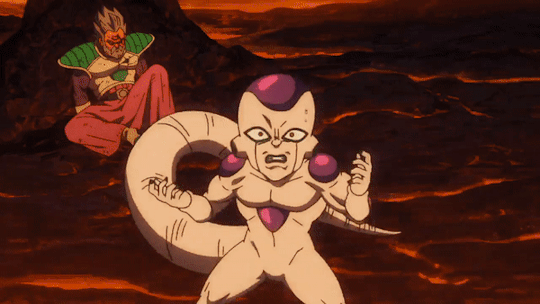
Broly
Having a Dragon Ball story focus on so many characters who aren’t Goku is refreshing for a franchise that’s been so heavily criticised for being The Goku Show… For years we’ve wanted to see other characters step into the limelight. I still haven’t forgiven the last movie, Resurrection F, for stealing the win out from under Vegeta.
Vegeta still doesn’t get the long awaited limelight here… But this “new” saiyan, Broly, is something rather special. I wasn’t a fan of the original Broly. Loved the idea, but never liked the execution. His visual design I found personally off-putting, but more importantly it failed to convey his character very well. He looked so prestigious? And the idea of being so affected by Goku crying as a baby next to him, that it sent him into uncontrollable rage whenever he heard the same “Kakarot” is so laughably stupid. I’m glad that’s not here.
The cool concept of the legendary super saiyan, though... I think most people dig that. Here that’s kind of gone too - but the idea of a freakishly strong saiyan from birth who is the embodiment of their animalistic heritage and rage-induced potential is beautifully executed. The great ape form, or rather Broly having found a way of accessing that power without transforming, is referenced more than once throughout the story. There’s this sense that the way Goku and Vegeta have learnt to control themselves has perhaps potentially hindered them. That maybe the ultra-instinct forms Whis has foreshadowed for so long is related, or could be used to tap into the natural potential of saiyans. Huh.
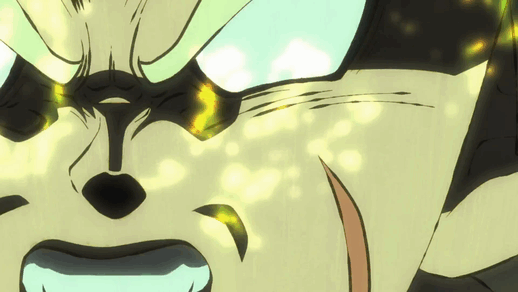
With a visually pleasing design to boot, Broly is absolutely awesome as the star in his own movie as a tragic menace. So much is done to sell this as Broly’s movie, from his sheer amount of screen time and characterisation in both his placid and manic states, to that awesome first person perspective part of his fight - incredible.
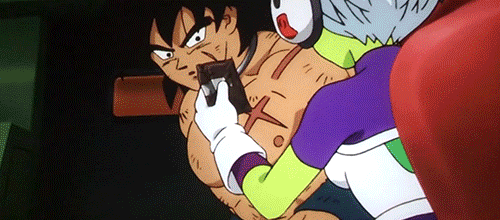

Animation and Aesthetics
You don’t need me to tell you this film looks gorgeous and I’ve already mentioned some scenes where the characters convey so much through movement alone. This looks like Dragon Ball never has. It feels nostalgic, but refreshing. It’s stylistically so unique and fluid and choreographed and magical. Impacts hit with such full-force conviction, the characters gracefully zooming around each other in dueling harmony, the electrifying ki beams piercing through the bleak environments with their vibrant colour and form. For once you really believe just how powerful and fast these superhumans are… Perhaps one of the reasons why the first half of the film is so much weaker for me is simply because there's less of this beautiful action. But the entire film is steeped in impressively bold and emotive colour pallets that sell the mood of each location so well.

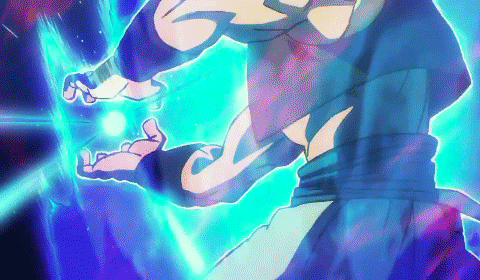
But there’s a great big elephant in the room… The cgi.
It would seem I have a different opinion to most on this subject. I don’t mind the environmental cgi, but the character animation is jarring and I hate it. It is a blemish on an otherwise gorgeous piece of art. Now, I’m really funny about “bad” cgi. I also don’t know dick about animation. I just know when something looks really, really wrong. It’s as if the cgi characters have no squash and stretch applied that keeps them fluid. They’re stiff. There’s no elasticity, no umph. They move like someone just put strobe lights on. Their joints like that of action figures. I’ve seen so many people say it’s not bad or they even like these parts and I’m really glad it didn’t ruin it for most people, but my god does it ruin those scenes for me. Just look at the awkward mouth flaps and dead eyes, especially on Goky, in the Kamehameha/Galick Gun combo scene. Yuck.
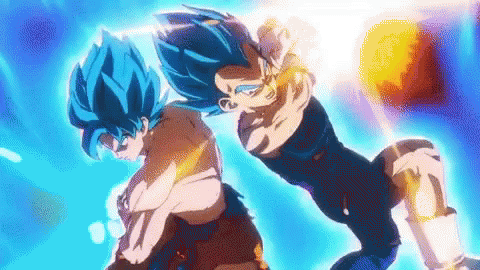
Soundtrack
I love the score.
Before I saw the movie, I heard a lot of people talking about the chanting and how weird it was - but the second it started my first thought was how much it reminded me of Akira. And yeah, it’s kinda weird. And I love it. It hypes up this epic match and I don’t find it cheesy at all. I love it both in context and even when listened to in isolation.
The entire score is all over the place yet manages to feel whole as it attempts, and succeeds, to convey the atmosphere and emotion of each location, narrative beat and every swing of a fist or blast of ki. The only track I’m not keen on is the rendition of Chala Head Chala. I think it’s a pretty pants rendition of the song and is immensely distracting in an otherwise moving soundtrack. The movie totally needs a rendition of Head Chala right there, but not this rendition. I just don’t like it. The weird boingy sound is awful.
Final Thoughts
The success of Dragon Ball Super: Broly, especially in the west, is a joyful reminder what this 30 year old franchise means to so many people. Very few non-fans are going to have set foot in a cinema to see this movie, and yet the current total earnings at the time of writing on January 29th 2019 is $98,584,176 according to Box Office Mojo.
That is truly insane.
It feels like this movie was made especially for me and for that I am eternally grateful. Speaking to fellow fans and reading their reviews, it’s so clear that everyone has different things to love about this movie. There’s so much content here for every fan to find something they love. I cannot wait to get hold of a home release and I cannot wait to see what’s to come, ho-ly shit! What a time to be a Dragon Ball fan.

#dragon ball super broly#dbz broly#broly#dragon ball super#dragon ball#dragon ball z#dbz#dbs#dragon ball movie review#saiyanhajime
43 notes
·
View notes
Text
The politics of RWBY and its faunus subplot
I love RWBY but every time I think about its politics it gives me a goddamn migraine
disgustingly long post below
So the main conflict of the story is the mostly apolitical struggle against the Grimm, and the largest subplot is the WF arc and the theme of anti-faunus racism
But the show has nearly nothing to say on the subject. Its message is almost utterly vacant.
We have Blake at the start of the show disillusioned with the only civil rights organization in existence, which is also a genocidal terrorist operation (🤔🤔🤔), and is left directionless and without a real idea of what to do.[1] Oobleck asks her how her being a huntress will solve the racism thing and she can't answer him. Okay, that's something: we could have a character arc about her finding direction and deciding to Do Something to Solve Racism.
But when she gives her speech at the end of the WF arc, in Menagerie like four volumes later, she still doesn't know what to do about racism! She scarcely mentions racism at all; all she says with any conviction is that the faunus population in general fails to denounce Adam’s WF. It reminds me of similar rhetoric with regard to Muslims in the US: if you're not loud enough in your denunciations, it's your own fault if people lump you in with the terrorists. Never mind that such demands are never made in good faith and minorities are lumped in with the terrorists anyway. If you're being discriminated against, it's your fault for not being a good enough citizen, and if you were just of better moral character you wouldn't be marginalized. That's all in the way of a plan Blake offers: just be a good person, and the humans will give you your rights!
So that's the message: racism is bad. Also, murdering innocent civilians is bad. Be a good person.
So what does "being a good person" mean?
Well, we can guess. A theme prominent here is forgiveness: Blake forgives Ilia. Implicit: the faunus should forgive the humans.[2]
That's it: forgiveness. Not, you know, any sort of political organization, or any sort of demands for justice, or any overthrow or even reform of corrupt institutions. Just keep playing the game and things will get better. Also, be willing to risk your life for others, and for the unity of the Society, even if they hate you. It’s not fair, but it’s the only way things get better.[3][4]
But is it, really?
We see a similar theme earlier, in V3. At the end of the volume we have narration by Salem to the effect of "unity" and "trust" being the greatest strengths of humanity. The obvious reading is, then, that unity and trust are Good. The Best, in fact. But what does that mean, exactly?
Cinder's monologue gives us an idea. According to her, the people have placed too much faith in their public institutions. Their "guardians" are authoritarian, secretive, and fallible.
There it is, then. The text is clear: distrust of powerful public institutions only helps the forces of evil.[5] (Also, the only people expressing such distrust are foreign chaos agents bent on destroying our freedoms.)
If "you should trust the authorities” seems to contradict the racism theme mentioned earlier, it actually doesn't. Racism in RWBY is never portrayed as an institutional or systemic issue; it's usually called "hatred". This allows for the text to acknowledge racism as an important issue that is a problem of character, rather than of power[6], and therefore attempts to address it should not destabilize existing power structures.
It’s no surprise, then, that racism, an ostensibly major theme, receives such scant attention. There's Weiss being racist, and Cardin being racist, the two things that receive more than a couple of lines on the topic. There's Blake's WF exposition that actually says very little about racism at all. There's a blink-and-you-miss-it "No Faunus" sign in a Mistral bar. There's Menagerie, some kind of faunus reservation, the nature of which is so vague it’s hard to say anything at all about it[7]. We get little attention to of (say) hiring or housing discrimination, or any other systemic racism; these are issues entirely foreign to the elite paramilitary children with whom the narrative is most concerned[8]. Again, racism presented as a character flaw, rather than a systemic issue of unjust power dynamics.
You can tell what a narrative cares about by what it emphasizes. The racism theme in the Vale arc is chiefly flavor for the hordes of faceless WF goons; the text doesn’t say anything worthwhile about racism itself. In the Mistral/Menagerie arc, the narrative is not about overcoming racism but about the recuperation of marginalized communities into the existing power structure in the name of unity and forgiveness.
What is lacking, I think, is any substantive or satisfying notion of justice. The text doesn’t give us any answer as to what should be done about racism, other than Be a Good Person, and that’s because racial justice simply isn’t that important to the narrative. Before solving a problem you must name it, and the text doesn’t. We have an entire racism/terrorism arc that manages to say nearly nothing on racism at all, because, as Blake says, the answer to the question of justice is complicated, and the text just doesn’t have the time.
[1]One funny thing to look at is Blake’s expository monologue to Sun in V1 about how the WF “turned dark”. The WF performed “organized attacks” by vandalizing discriminatory businesses and expropriating goods from corporations using “faunus labor”(does this mean slavery? or employees? that would be weird). It’s strange that these would be the things that forced her to leave; property crimes aren’t really a big deal compared to the killing of civilians depicted in the black trailer, which she for some reason doesn’t bring up. She says that it was working, and that human fear brought equality, but that such equality was bad since it wasn’t out of respect (and therefore would be fleeting). This is incredible in two ways. First: a government and populace that actually feared the WF would not bring equality, but rapid extermination (of the WF, that is). Fear doesn’t actually help unless you have power, and the WF seem to have no base of material or popular support and no praxis except insurrectionist violence[A]. Second: if it were somehow actually working, then why did Blake leave? What was the purpose of all this action, if not to attain power by making yourself a credible threat? Did you become a liberal out of nowhere? That she talks about property crime and “fear” instead of the killing of civilians is baffling.
[2]Yes, I know that Blake wants them to specifically go to Haven and physically stop the WF. Yes, stopping a terrorist attack is good, even if these civilians aren't at all fit for purpose. But this doesn't itself help to stop racism, which is why I didn't mention it specifically above.
[3]This mirrors the confrontation between Yang and Raven wrt Salem and the relic.
[4]We do learn later that Blake wants a “new” WF. This means, presumably, that the WF will go back to peaceful protest. But that doesn’t come up in her speech, and no mention, of course, of how it would help them in achieving their goals, or even what those goals are, specifically, other than ending “hatred” in general. March to End Racism. What a visionary.
[5]Also, distrust, anger, and other “negative emotions” attract the Grimm. That’s like metaphysical tone policing right there.
[6]There’s backstory of faunus having been enslaved which would count as systemic racism, but it doesn’t come up later or really affect anything on-screen, and the text doesn’t portray it at enough length or depth to characterize it as such.
[7]Menagerie being crappy must be understood within a wider context: why live in Menagerie, if it sucks, instead of where everyone else lives? Not much attention given to why this happens (other than perhaps “individuals are racist”). And does Menagerie being crappy actually have any consequences? Like economically, or socially? We don’t see them.
[8]The times where it seems the text might make a systemic critique are Adam’s backstory and Atlas in general. Adam’s trauma isn’t really remarked upon; he’s not a sympathetic figure. We don’t know much about Atlas since that’s for next season, but limiting your systemic critique to the one racist place seems a bad way to do things. We’ll have to see how it goes.
[A] Also, it’s not clear when the WF moved from “property crime” to “kill all humans”(which is comically over-the-top), and no one remarks on it. It gives one the sense that the narrative sees property crime and genocide as equally objectionable.
[ADDENDUM] Some might object by way of noting that RWBY hasn’t taken us to Atlas yet, where the racism lives, and that the WF arc wasn’t primarily about racism, but terrorism, so one shouldn’t expect the theme of racism to be addressed before Atlas. The problem is, though, that the WF was ostensibly founded as a civil rights organization; you cannot meaningfully conclude an arc on the WF without addressing racism. For example, at the end of V5 says that she wants to build a “new” WF. What does this mean? We never find out, because it’s not that important.
#rwby#if you enjoyed this content consider subscribing to my Patreon#which you can find on my linkedin page
9 notes
·
View notes
Link

John Newton — of “Amazing Grace” fame — once shrewdly wrote to a correspondent that a misunderstanding of the law of God lies at the root of most mistakes in the Christian life. Many of the spiritual masters have agreed with him. That explains why as much as 30–40 percent of the Reformed catechisms are devoted to an exposition of the Ten Commandments.
What did they understand that we fail to grasp? Much. And hearing the law through their ears will help us greatly as we consider the first commandment of the Ten: “You shall have no other gods before me” (Exodus 20:3).
Sinai’s Background
We can sketch a Reformed understanding of the law under six headings:
The law is rooted in the covenant-making and covenant-keeping character of Yahweh. It is prefaced by the words “I am the Lord your God” (Exodus 20:2). It is a summons to reflect his moral glory.
The law was given in the context of God’s redeeming grace: “. . . who brought you out of the land of Egypt, out of the house of slavery” (Exodus 20:2) — the event that typified the “exodus” that Jesus would accomplish at Jerusalem (Luke 9:31).
The negative form in which most of the commandments come is designed for the safety of immature sinners — in the same way we tell our very young children, “Don’t do that” long before we explain our instructions in detail.
The commands that forbid any action imply the responsibility to express their opposite. Jesus made this clear in the Sermon on the Mount (Matthew 5:17–48), but it was already present in the old covenant: for example, Exodus 20:3 is expressed in positive form in Deuteronomy 6:5.
The more we appreciate how wonderful the grace of God is, the more we will embrace the all-demanding nature of his law. The stronger the indicative, the more demanding the imperative it can bear! Consider, then, a biblical health warning: strong indicatives with weak imperatives produce spiritual weakness.
The wisdom of the commandments lies in the fact that they express (yes, briefly and in negative form since we are sinners) what we were created to be — men and women made as the image of God to reflect his glory. In that sense, the so-called “third use of the law,” by which we use the law to guide our lives, was originally its first use.
Against this background, Exodus 20:3, “You shall have no other gods before me,” is not only the first but the greatest commandment. All the others follow from it. Without conformity to this commandment, obedience to the other nine is impossible.
But didn’t Jesus say that the greatest commandment was to love the Lord with heart, soul, mind, and strength (Mark 12:30)? Indeed, but as Deuteronomy chapters 5 and 6 suggest, those words are simply the positive exposition of Exodus 20:3, and an illustration of point 4 above.
Our Dearest Idols
It should not surprise us, then, to discover — about others, or about ourselves — that as the first and greatest commandment, it is also the first to be broken. That was true in Eden, where Adam and Eve gave priority to the snake’s false interpretation of reality and made him “the god of this world” (2 Corinthians 4:4). It was also true at Sinai, where the liturgy of the golden calf was introduced. The closing words of John’s first letter (“Little children, keep yourselves from idols,” 1 John 5:21) suggest that there is as real a danger for Christians at the foot of Mount Calvary as there was for the Israelites at the foot of Mount Sinai.
Our idols do not need to be forged from earrings to constitute a spiritual danger to us. They appear whenever we exchange “the glory of the immortal God” for anything in the created order (Romans 1:23). That is why Ezekiel’s unique turn of phrase is as apt a description of the earlier Israelites, and alas of ourselves, as it was of his contemporaries. He spoke of those who set up idols “into their hearts” (Ezekiel 14:3–7). Was it this that prompted Calvin’s pointed comment that “man’s nature, so to speak, is a perpetual factory of idols” (Institutes, 1.11.8)?
It is clear enough in our Lord’s teaching that it is not only crass things that can usurp our first devotion. The higher the position something occupies on the scale of divine blessing, the more subtle the temptation to worship it. And so, Jesus warns us pointedly, if any man “does not hate his own father and mother and wife and children and brothers and sisters, yes, and even his own life, he cannot be my disciple” (Luke 14:26). These relations are God’s greatest natural blessings. And we should not fail to notice the sixfold and. It is not a matter of three out of six being the pass mark. All must be “hated” (Jesus’s word, not mine) if we are to be his. Is there, perhaps, an echo here of the sobering words describing the judgment on idolatry in Deuteronomy 13:6–9? Newton’s friend William Cowper was right, then, to pray,
The dearest idol I have known, Whate’er that idol be, Help me to tear it from thy throne, And worship only thee.
He knew it was the only way to the “closer walk with God” he so desired. He also understood better than we moderns tend to that this rigorous, almost violent approach is in fact the grace-way of the new covenant: “The grace of God has appeared, bringing salvation . . . training us to renounce ungodliness” (Titus 2:11–12). Grace, in this sense, is a killer.
‘Before My Face’
We like to be able to “tick the boxes.” But any checklist of the ways in which we can have other gods today is bound to fail. Nevertheless, built into the language in which this first commandment is expressed is a kind of litmus test that helps us to detect the presence of the other-gods-before-God disease (at least, so it seems to me). The litmus paper can be seen to an extent in our English translations. Clearly the words “you shall have no other gods before me” do not imply that they can be tolerated so long as they have a lower priority. But the Hebrew expression is more forceful. It means, literally, “before my face” — “You shall have no other gods before my face!”
Perhaps significantly, this is the same expression that is used of Adam and Eve when they had worshiped lesser gods: they “hid themselves from the presence [from the face] of the Lord” (Genesis 3:8). Having obscured his face by bringing other gods closer to their spiritual vision, they could no longer bear the thought of seeing that face. This is the poison of having other gods: they not only take priority over our heavenly Father, but they also create an inner antipathy to him that soon becomes a deep-seated hostility.
And anything can be deified. The smallest coin brought near enough to the eye can obscure the entire universe from sight. Anything that tends to obscure our clear vision of God must come under a ban.
Yet, paradoxically, we must resist the instinct to make our assessments by sight. God’s people learn that the only safe sense is hearing, that is, listening to the voice of God in his word, not interpreting reality through the vision of our eyes. Had Eve (Genesis 3:6), and Aaron (Exodus 32:4–6), and Achan (Joshua 7:20–21), and David (2 Samuel 11:2) looked through their ears, matters might have been very different.
Word of Hope and Joy
The first commandment is intended to be a major help to us. The Christian life is a perpetual roller-coaster of discovering our sin and the remnants of our devotion to lesser gods, leading to a fresh seeking of Christ’s pardon and power, and then on to a rediscovering that our idolatries run deeper into our being than we formerly suspected, so that we seek Christ’s grace more — and on and on. We need perseverance in the pursuit of godliness. So, lest we be discouraged, it is important to notice the word of hope and joy that is embedded in Exodus 20:3.
We refer — rightly so — to the Ten Commandments. But the Bible calls them, literally, the Ten Words. True, they enshrine commandments, as we have seen. But they also contain a word of promise and grace, even a word of prophecy. Written into the imperative we hear a glorious indicative: you shall have no other gods before him! In Christ, and through the Spirit, this has already become true (Romans 8:3–4). Before his face, we can already say when he asks us, “Do you love me more than these?” “Lord, you know everything; you know that I love you” (John 21:15–17).
And there is more. For one day, we will see him face to face and be like him. “And everyone who thus hopes in him purifies himself as he is pure” (1 John 3:2–3).
Mentioned by Name
James Fisher (1697–1775), in his once-popular eponymous catechism, asks the question, “Why do this, and other commands, run in the second-person singular, thou and not in the plural, you or ye?” His answer? “To signify that God would have us take his commandments as spoken to each of us in particular as if we were mentioned by name.”
“You shall have no other gods before me” — it would not be such a bad idea to print out these words on a small card, insert your own name, and refer to it frequently, would it?
0 notes
Text
My Top 10 Moments of THE ROYAL TUTOR
I did not even know this series existed until I saw the trailer (in Japanese) during Todd Haberkorn’s panel at SakuraCon 2017. I remember thinking that it looked interesting, but knowing nothing about the cast or the story, I sort of forgot about it.
And then I saw the first episode on the FUNimation site, and I immediately fell in love. I religiously ran home every Tuesday night after work to be sure to catch each simuldub episode as it was released, doing everything I could to avoid spoilers. I laughed until I was breathless and in pain at times. I cried more than once. I watched and re-watched certain scenes because they were just that good. And I am devoutly praying that we get a Season 2.
I cannot recommend this series highly enough. It’s available on Crunchyroll subbed, and on FUNimation’s site dubbed. It is so very well worth the watch.
Having now seen the entire series (repeatedly binge-watching it between new episodes, and making audio recordings so I could listen to the series while at work), I just have to share some of the moments that just embody all that make this series so wonderful. It is (mostly) spoiler-free, but you have been warned.
Your mileage, of course, may vary.
#10 - The teacher learns the students' lesson (Episode 2, “The Prince Interviews")
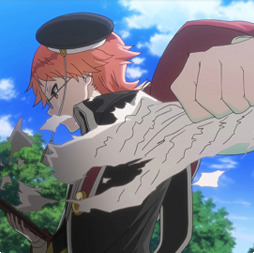
The moment that first really got my attention for Heine. The notion that he could learn just as much from the princes as he could teach them made him a much more relatable character, and it also gives a subtle but deft hint of the standard to which Heine holds himself. Like his students, he doesn't always get it right (considering his inadvertent failure to consider his words before he speaks with Leonhard in the very next episode), but the first steps are there. And its theme is repeated over and over throughout the series.
#9 - 1.3 million lives (Episode 4, “The Princes Go to Town”)
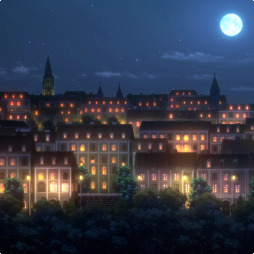
A surprisingly beautiful moment that provides much-needed exposition without you even realizing it's doing it. That the princes can't see the forest for the trees becomes their first real lesson - while studying with Heine, it's not just about facts and figures and history, but the realities of the kingdom that they stand to inherit. (And this is just the capital, which lies right outside their palace door - you can almost hear the realization set in of how much more vast their responsibility will be to an entire kingdom.) And when balanced with later episodes and Heine's background, it gives it a much more poignant feeling upon re-watch.
#8 - Kai and Helene (Episode 8, “A Timid Heart”)
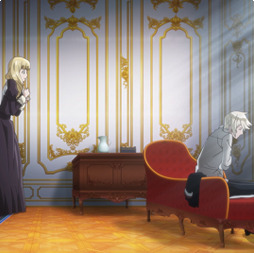
I don't care what the manga says, I am firmly captaining the Good Ship Kai/Helene (see my vignettes 'Tea and Sympathy', 'Silent Treatment', and ‘Words, Words, Words’). Kai's struggles to express himself are eminently relatable, as is Helene's frustrated sadness at not knowing how to make things easier for him. And to see the evolution of Kai's relationships with the palace staff in general (and Helene in particular) is deeply satisfying. To convey so much through so few words is a gift. And the scene in the garden is both beautiful and bittersweet - massive props to both Daman Mills as Kai and Sara Ragsdale as Helene.
#7 - Heine wins over Leonhard (Episode 3, “You Don’t Need to Accept Me”)
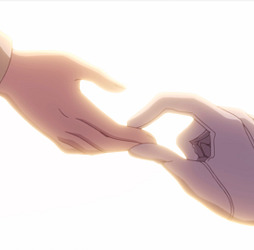
I almost went with the sachertorte moment over this one, but between the music, the art direction, and the voice acting, Heine's quiet but impassioned speech to Leonhard imploring him not to give up on himself came through in the end. And Micah Solusod as Heine and Alejandro Saab as Leonhard completely sell the first true beginnings of this teacher/student bond. Leonhard finally gets the tutor he's so desperately needed, and then two episodes later, the whole scene gets a marvelous callback.
#6 - The princes’ investigation (Episode 11, “The Pair’s Promise”)
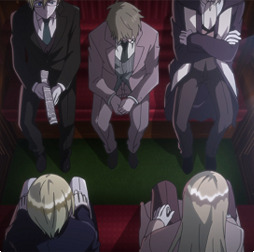
Another segment bolstered by fantastic music and vocal performances, this one makes the list because now we see just how far the princes will go for what they believe in (a nice setup for what comes in the final episode). Admittedly, the apples don't fall far from the tree when it comes to the misuse of authority and power at that age (as we see later in the same episode with Viktor himself), but the princes' investigation shows a logical precision and ruthless determination to face an unpleasant truth.
#5 - Licht and Viktor (Episode 6, “At Café Mitter Meyer”)
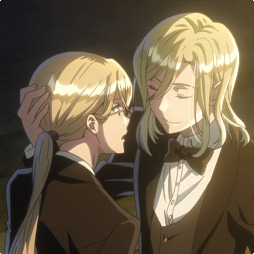
I admit that of the four princes, Licht took the longest to win me over (initially, I kept mentally comparing him to Ukyo from Samurai 7, which is still a compliment). One of the most poignant moments in a series filled with them, the scene of Licht and Viktor talking outside the café is heartbreakingly lovely and real. Outstanding dialogue and voice acting from David Wald and Stephen Sanders (as Viktor and Licht, respectively) takes what could have been sappy and overplayed, and turns it instead into a breathtakingly real scene - being willing to put aside your own wishes and wants to make the person you love happy.
#4 - Heine pleads with God (Episode 11, “The Pair’s Promise”)
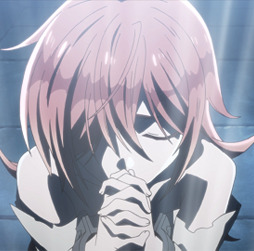
Probably the shortest scene on the list, but there are two reasons why I put this one this high - an astonishingly deft vocal performance from Micah Solusod as Heine, and a shining character moment for Heine. Heine's voice throughout nearly the entire series up to this point has been controlled, calm, almost stoic - but when it finally breaks, the depth of feeling is tremendous. It is also the only time in the entire series we see Heine ever ask for something, and even then, it's not for himself.
#3 - Bruno’s inner demons (Episode 7, “The Whereabouts of a Dream”)
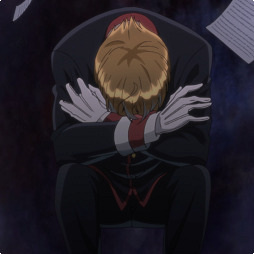
I will freely admit that Bruno is my favorite character in this series, in no small part thanks to consistently amazing performances from Chris Wehkamp. Up until now, Bruno's relentless pursuit of academic superiority has been almost played for laughs. But Bruno's internal monologue while delivering his paper, and his later confession to Heine beneath the rose arbor, give him a depth that is agonizingly real. And then to see them counterbalanced by his moments of absolute joy is a sheer delight.
#2 - The dreams of four princes (Episode 12, “The Last Lesson”)
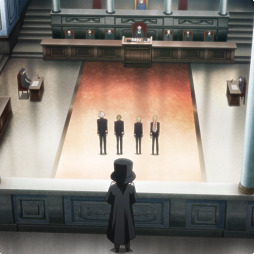
A soulful, desperate plea from our young princes to the men who will supposedly decide their future. All of Heine's efforts bear fruit as the four share their hopes and dreams of what Granzreich could become if given the chance. Even in the face of near-certain defeat, they stand their ground and make their case, to devastating effect. Some of my favorite music cues from the series, plus earnest performances from our leads and dialogue echoing lessons from the very first episode, make this anime-only scene so worth the watch.
#1 - The entire wine cellar scene (Episode 9, “The Price of the Past”)
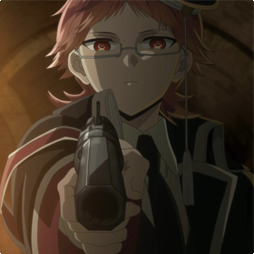
This is where I gush. The other nine spots on this list had me re-arranging them constantly, but this spot was never in doubt. The entire scene in the wine cellar is hands down one of my favorite in all of anime - the art direction, the dialogue, the choreography, the vocal performances (especially from Daman Mills as Kai and Micah Solusod as Heine, though Dallas Reid as Maximillian damned near steals the scene), and above all the music (the ONLY time that particular cue is used, and it is astounding - if this series gets a soundtrack, it had damned well better be on it), all come together for a tour de force. The insights we get into both Kai and Heine on real strength and when to use it (and not use it) are some of the most effective in the entire series. And all of Heine's myriad facets come together in this one scene with a clarity and economy that is as visceral as it is beautiful. I can watch this five-and-a-half-minute scene (or even just listen to it) over and over and never tire of it.
26 notes
·
View notes
Text
Haifuri
“Haifuri” aka “High School Fleet” aka “That One Show That’s Like ‘Girls und Panzer’ But Is Different From ‘Girls und Panzer’ Because They Operate Battleships Instead Of Tanks” has conquered every part of my brain. I find myself in the middle of the night thinking about Haifuri: Did I like it? Did I hate it? Remember when that thing happened? etc. This show has managed to occupy my every thought process and I need an outlet. Normally I like to keep reviews spoiler free but that simply cannot be the case this time. Get ready for my longest review yet.
I’m gonna start with what I enjoyed from the show. The animation is solid, each character is unique and recognizable, movements are fluid for the most part, the battleship design is cool, and the interior shots/settings are really neat. The battle scenes are surprisingly well done; we see each compartment of the ship performing their individual tasks and coming together to overcome hardships (pun intended). What I enjoyed even more was when battles aren't happening. Much like Girls and Panzer, the show excels in its amusing slice of life moments. Dealing with problems like running out of water and putting on festivals give depth to the show and personality to the crew. "That girl who fires the torpedo" "Those three that does the cooking" and "Trumpet player" start to have names that you remember, friends they hang with, emotions they express, hobbies they enjoy...etc. Whoever wrote the show understands that supporting characters with personality is the difference between a fictional world that's alive and one that's not.
Now on to the parts I didn’t particularly enjoy or is straight up confusing. Last night I compiled a list of things in Haifuri that bothered me, spoiler ahead.
1. Mike (me·keh) and Moka
Mike(Misaki) is our main protagonist and captain of the ship, and Moka(Moeka) is her childhood friend and captain of another(much bigger) ship. The story mainly revolves around the fact that Moka’s ship is in distress and Mike wanting to save her friend. The premise is fine... Except I literately don’t give two shits about Moka. Moka is a prime example of why the “childhood friend” trope is one of the dumbest things in anime. In the first episode we have Mike and Moka as children and it shows the two of them sharing the dream of becoming “Blue Mermaids” who protect the sea. In subsequent episodes we get some flashbacks of Moka expressing her view that “everyone on the ocean is family”, an ideology in which Mike adopts. We get excessive shots of Mike looking worried about Moka. And that’s it. Moka literately have no personality other than “childhood friend of Mike”. Imagine being at a party and the people you talk to only talk about their other friends who isn’t at the party. That’s what it feels like when it comes to Mike and Moka. Mike on the other hand, does get some character development. That being said, out of every other character on the ship (there’s 32 total including the cat), Mike managed to be the most bland and brain dead of them all. She’s in the protagonist role simply because it’s easy for audiences to project onto her blank personality and insert themselves into the show instead. Her most notable trait is that she’s afraid of lightning due to a tragic event in the past. Luckily the show tend to give more screen time to more eccentric characters in the grand scheme of things.
2. One-liners
“The wind is blowing, the wind of hope” said Moka in a room with the windows closed and door barricaded. This line of dialog completely ruined what’s otherwise a decent action sequence. “Tama, fire with your soul” (it’s a pun when spoken in japaneses) and “With this shot, we’ll grab our chance” are just some other glorious eye-rolling one-liners in this show. Anyways, these really don’t detriment the show all that much but are still worth mentioning.
3. Flashbacks
Flashbacks, when used correctly is one of the best story telling mechanisms out there. Sadly, it’s been used much more frequently as a way to avoid actual good story telling. If something truly important had happened in the past then it’s almost always better to show it in the beginning rather than in the middle. If you did it correctly the audience wouldn’t even need a reminder in the form of a flashback. I’m referring to Mike afraid of lightning and her relationship with Moka. Instead of sprinkling bits of flashback throughout the series and frequent reminders of who Moka is; I truly believe the story would flow a lot better if we got the whole first episode dedicated to Mike’s past and Moka, where Haifuri begins in the present time should be mid-episode 2. This way I might connect better with Mike as a main character and give a damn about Moka.
4. Why things went wrong
This is a major spoiler point. This whole mess is due to some magical virus carried by rats that infected the instructor’s ship and surrounding ships. A zombie-like virus that controls the host to be hostile against the uninfected. The doctor on board, due to her character trait as a genius found the antibody/cure. Oh, and in early stages of infection spraying the infected with sea water would also do the trick. Like... wtf. It’s not how viruses, geniuses, antibodies or seawater work. But, whatever, it’s a show that’s meant to be entertaining so this is just me nitpicking. Still... Wouldn’t the instructor purposefully sabotaging the students in hopes of framing the principal to gain power made for a more logical and dramatic plot?
5. Logic
If you have any common sense then there are points in the show where you’ll go “Why?”, “How?”, “What??”, “k, that just happened.” or a mixture of those reactions. The most notable one is in episode 4 when a crew member got infected and is going crazy so the German deputy captain straight up throws her into the ocean. Ok... the impact should’ve killed her. However not only did it not kill her, she just magically gets shot back up onto the ship by the ocean “Moana” style and is no longer infected due to being in contact with saltwater. (O.O) HOW??? That sequence of events has kept me up at night, I’m so baffled by it that I’m losing sleep. Another lesser wtf anime moment is one of the Blue Mermaid captain got these robotic looking cat ears on her head. Like, why does she have those? Nobody else in the entire show is wearing robotic cat ears. Is it a fashion statement? Do those serve a purpose? The show doesn’t even acknowledge them once but they’re there!! Again, I’m left wondering.
6. Marketing/Other
This anime is so poorly and confusingly marketed. It’s initially called “Haifuri” but on MAL it’s “High School Fleet”. It was released last year and i somehow completely missed it. It’s a ghost of an anime. Several sources have conflicting information as to if it’s an anime original or based off of a manga. The VA for the main German character that threw the indestructible girl off the boat has voiced several characters in hentai. <--This isn’t a negative point, just something interesting I wanted to mention.
7. Right things at the wrong time
There were several instances of this in the show but I’ll only mention the most aggravating one here: So the Blue Mermaids has this oath that they chant which goes “Live on the sea. Protect the sea. Sail the sea”. It’s honestly kinda cool. Anyways, Mike and Moka always say this to each other as kids and it’s real sweet and cute and stuff. At one point mid-battle Mike and the other main characters each say a part of the oath and it actually sent a chill down my spine. This was such a cool/symbolic moment for these characters. Mike only ever said the oath with Moka but in that moment you realize she’s no longer saying to herself but with h̶e̶r̶ ̶c̶r̶e̶w̶ her new family. This fantastic moment only happened once, and it wasn’t even that big of a battle. Instead of something like this during the finally we instead get Moka’s “The wind is blowing, the wind of hope”: a shitty one-liner from a character with no development.
8. German
I don’t speak German, and I don’t need to in order to wince at the German spoken in this anime. I can’t really fault anybody here since it’s probably asking too much for native Japanese speakers to nail German lines.
9. No introduction
Out of the 32 characters on the main ship in Haifuri, only like 8 of them got somewhat proper introductions. This is not an objectively negative point toward Haifuri but I can easily see how it might agitate viewers. I personally found it neat that I got to know side characters over time through familiarity, but for others this may be a hassle. At some points I had to pull up the wiki after seeing a character and wondering “what do you do here again?”. For me this is actually a positive trait, the show wasn’t going to introduce 32 characters one by one so it instead did something neat and gave you the “first day in a classroom” feeling.
10. Exposition
The world setting of Haifuri is given through exposition. However it was a neat moment I had upon realizing that the city beneath the ocean at the coast is the sunken remains of modern day Japan and not Rapture.
You might think that with all these negative points I must have had a terrible time with Haifuri, but it’s quite the opposite. I for the most part very much enjoyed watching Haifuri. It’s madly entertaining compared to the majority of animes out there. These negative points are more so pet peeves of mine than real negatives that truly ruins a show. And to be honest, I derived quite a bit of enjoyment from these nitpicks. In the end the ship crew of Haifuri really made an impact to me and it’s an anime that I’m unlikely to forget. 7.5/10
0 notes